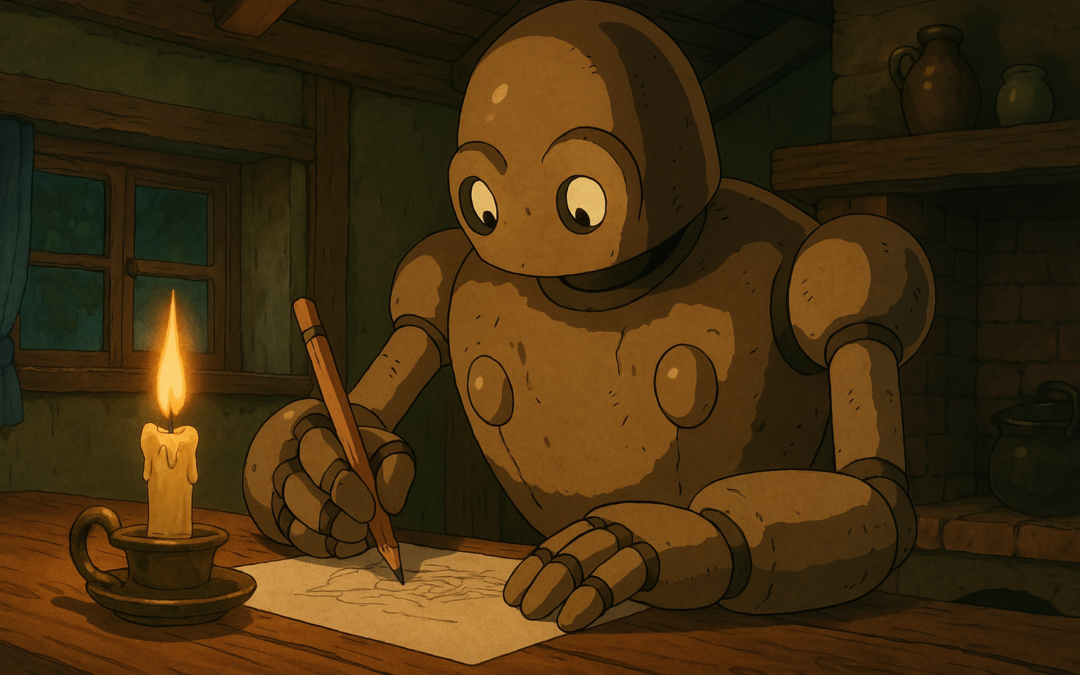Is AI quietly replacing artists—or are we just getting louder about it?
Remember when making art meant staring at a blank page, wrestling with inspiration, and maybe crying a little? Now you can ask a robot to do it for you. “Make it Ghibli,” you type. And voilà—an AI conjures up a dreamy, melancholic robot sketching in a candlelit cottage faster than you can say, Miyazaki would hate this.
Welcome to 2025, where artificial intelligence isn’t knocking at the door of the creative industry—it’s already moved in, left dishes in the sink, and started rearranging the furniture.
Studio Ghibli Goes to the Machines
Studio Ghibli once stood for something sacred: hand-drawn frames, impossibly soft lighting, and a deep commitment to making us cry over animated tree spirits. Now? We’re feeding selfies into prompts and turning them into Totoro fan fiction.
There are AI tools that can mimic the Ghibli aesthetic so well, it’s a little unsettling. They can:
- Turn your awkward holiday photo into something that looks like it belongs in Howl’s Moving Castle.
- Reimagine internet memes with a melancholy forest backdrop and lanterns for no reason.
- Let you tweak the “vibe” of the image, because your AI-generated Ghibli fan art wasn’t quite moody enough.
It’s all very magical until you realize that no one actually drew any of it.
Music Is Also Being Auto-Tuned to Death
It’s not just images. AI is now composing music—real music, kind of. Tools like AIVA and Amper can crank out original compositions based on a mood. Want a sad piano piece for your “Woke up existential again” TikTok? Done.
Sure, it’s impressive. But also: is it still music if no one bled for it?
So… Are Artists Just Unemployed Now?
Let’s address the collective anxiety humming beneath all this like a low-budget soundtrack. Are we all just going to be replaced? Is that it?
Because yes, AI can replicate artistic styles frighteningly well. But it can’t feel heartbreak. It doesn’t get goosebumps. It doesn’t stay up until 3am doubting itself. It’s just really good at pretending. And that’s the problem—it pretends so well that people start forgetting what real felt like.
Also: no one knows who owns any of this. AI is trained on human-made art scraped from the internet without asking, which is basically like stealing someone’s diary and using it to write a best-selling novel.
Creativity or Just Content?
What we’re seeing isn’t just a tech revolution—it’s a vibe shift. AI gives us endless images, infinite songs, constant stimulation. But too much art starts to feel like wallpaper. It’s pretty, but does it mean anything?
We’ve blurred the line between “creative tool” and “creative replacement.” Now we’re all just scrolling through a feed of slightly soulless masterpieces, trying to remember what it felt like when something really hit us.
Where Do We Go From Here?
Here’s the uncomfortable truth: AI isn’t going anywhere. And honestly, neither are we. Artists will adapt, rebel, integrate, or implode—depending on the week. But maybe what matters isn’t whether AI can make art. Maybe what matters is whether we still care when it does.
If the soul of art is human, then maybe it’s time we stop outsourcing our expression and start paying attention to what we can only do—feel, stumble, obsess, and make something that an algorithm can’t quite explain.
Or, you know, just keep feeding selfies into the prompt machine. That works too.
Sources
- DigitalOcean. (2024, September 17). 10 AI music generators for creators in 2025. Retrieved from https://www.digitalocean.com/resources/articles/ai-music-generators
- Laney, Douglas. (2025, February 11). Copyright or copywrong? AI’s intellectual property conundrum. Retrieved from https://www.forbes.com/sites/douglaslaney/2025/02/11/copyright-or-copywrong-ais-intellectual-property-paradox
- Pant, Smarica. (2025, March 27). What is Studio Ghibli? ChatGPT’s new image feature: All you need to know. Retrieved from https://www.indiatoday.in/amp/information/story/what-is-studio-ghibli-chatgpts-new-image-feature-all-you-need-to-know-2699936-2025-03-27
- Pixlr. (2025, January 1). AI Image Generator: Turn text to images, generative art and generated photos. Retrieved from https://pixlr.com/image-generator/
- Raza, Abeer. (2023, January 11). Three ethical concerns about AI-generated art. Retrieved from https://www.inc.com/inc-masters/three-ethical-concerns-about-ai-generated-art.html
Other Articles
7 Reasons Not to Quit Your Job to Start a Business
The Hidden Costs of Workplace Context-Switching
Remote Work Evolution: Pandemic, Hybrid, Future


Recent Comments